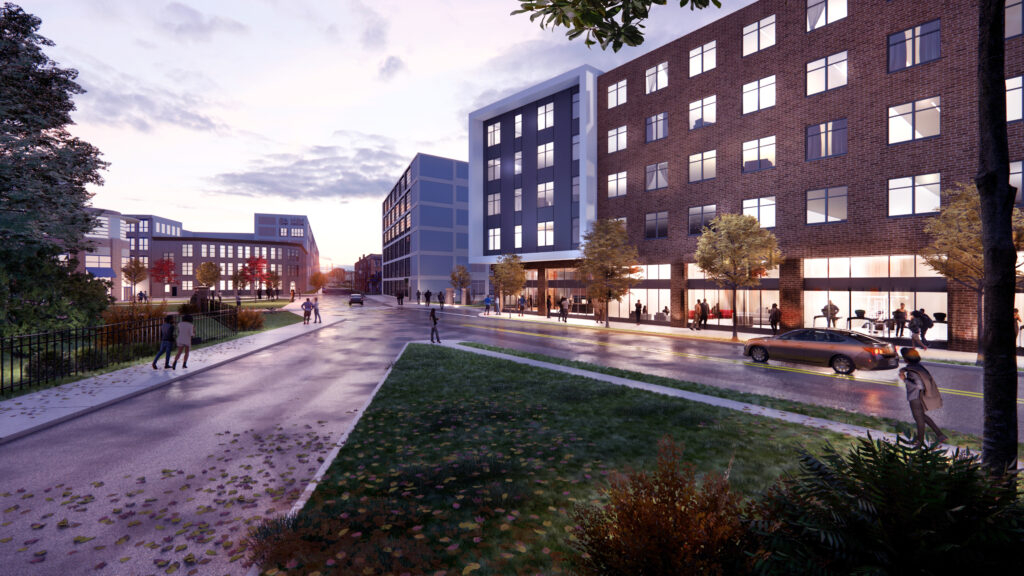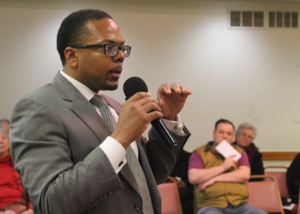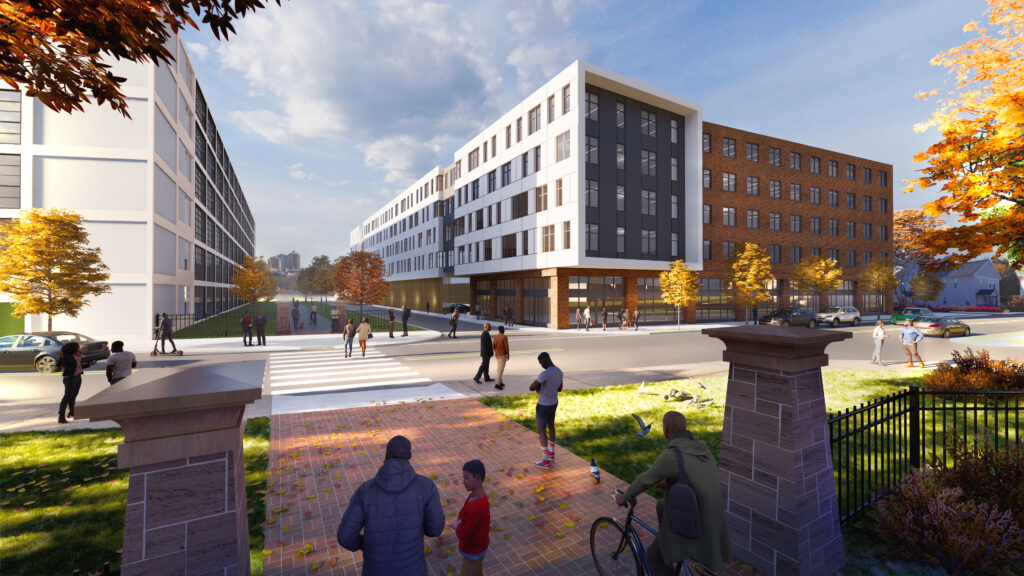

Dixwell residents gathered in the Q House gym to hear about a revived and changed plan to build 176 new apartments on the vacant city lot where Henry meets Ashmun and Canal Streets by the Farmington Canal Trail — and some emerged mulling whether to apply for a new home or a job.
Dixwell Alder Jeanette Morrison convened the meeting Thursday evening alongside developer Yves Joseph of RJ Development + Advisors, who presented plans for the proposed apartment complex to 20 neighbors.
The city has attempted numerous projects at the long-vacant, 1.7 acre site at Ashmun and Canal, including a senior housing complex, to no avail — until it agreed to sell the lot to Joseph’s team for $500,000 in 2020.
Per a Development and Disposition Land Agreement (DLDA) with the city, Joseph has agreed to designate one third of the 176 apartments — 58 units — as “affordable.” He estimated that 10 apartments would go to federally subsidized Section 8 tenants; 15 would go to households making at or below 60 percent of the regional Area Median Income ($43,260 for a one-person household); and 33 would go to households making at or below 80 percent AMI ($55,950 per year for a one-person household.)
Of the 176 apartments, 68 apartments will be one-bedrooms, 72 will be studios, and 36 will be 2‑bedrooms.
RJ Development + Advisors has not received any federal or state subsidies for the project, although the city agreed to cap property taxes on the below-market-rate units to $400 per unit for the first five years.
The development is slated right alongside the Farmington Canal Trail — a feature that architect Jay Brotman of Svigals + Partners sought to work into the design. The group is considering including a bike repair facility in the first floor of the building, along with other amenities for residents such as a gym and study area, he said. Beneath the building, 88 parking spaces would exist underground for tenants.

The sleek, white-and-brick design would be “blending in, yet setting ourselves off a bit.” The building would mirror the “industrial aesthetic” of the Science Park area, Brotman said.
“When I see that,” said Morrison, pointing to Brotman’s designs, “I say, ‘Wow, that’s expensive. Can I afford that?’ ” But from speaking with Joseph, Morrison said, she believes “he is very committed to making sure we can live here.”
Joseph said the decision to allocate one third of units as affordable housing came, in part, from Morrison’s advocacy. He added that mixed-income housing construction is a personal issue for him, having grown up in the South Side of Chicago where his neighbors struggled to find affordable homes. “When you create inclusive communities, it benefits everyone in that community,” he said. He aims to “put as many Dixwell/Newhallville people in as possible.”
Joseph stressed that the below-market-rate apartments would be randomly designated, and tenants of those units would have full access to amenities. “There will be absolutely no segregation of affordable and market-rate units,” he said.


The Dixwell-Newhallville area seemed like a good area to build such a project, Joseph added. In addition to its spot along the Canal Trail, the lot is located directly across the street from Science Park, where new businesses and high-end apartment complexes have sprung in recent years. It’s also nearby the soon-to-be-redeveloped Dixwell Plaza, a project that Joseph’s company is working on as well.
Dixwell neighbors said Thursday night that they have felt that change — and that they want to ensure that their neighborhood, which is predominantly Black and working class, is included in plans for future buildings.
“What made you cap off at two bedrooms?” Adair Franklin asked Joseph. She noted that the city is facing a shortage of three and four-bedroom units that families with multiple kids can afford.
“Hopefully, we’ll have the opportunity to do more family housing,” said Joseph. Financially, however, it’s “extremely difficult to make that work” without subsidies.

“I hear what you’re saying,” Franklin said, “but this seems to be a copycat building. All [of the new developments in town] are one-bedroom, two-bedroom apartments only. It’s like, OK, who are you pushing out?”
Alder Morrison argued that compromise is necessary with developers: “Either we fight with people and get nothing done, or we work with the people and get something.”
Attendees also raised concerns that the number of parking spaces allocated for tenants would not be enough to accomodate everyone’s vehicle.
Morrison pointed out that at the center of the city, Dixwell is within walking distance of many parts of New Haven. “Everybody doesn’t have a car,” she said.
“That’s what they’re hoping,” Lindsey Ruminski said in response.
“A lot of renters in studios don’t have cars,” Joseph elaborated. He added that his team has connected with other garages in the area in case the underground parking is not sufficient for tenants.
Attendees Become Prospective Applicants

Michelle Cave, who lives around the corner from the proposed building, came to Thursday night’s meeting after receiving a mailer about it.
She had never been to that type of public meeting before, she said, but she wanted to make sure the developer is committed to fair and equitable workforce practices. “I want to make sure the employees are covered, how many will be locals, and are they bringing in people to help learn the trade,” she said as she peered at a floor plan poster at the front of the room before the meeting began.
Cave was particularly interested in learning about the developer’s hiring practices because she herself is a carpenter — albeit one on the mend, and taking time off from work, after a recent surgery.
A representative of the Whiting-Turner Contracting Company in charge of construction and speakers from the Jefferson Apartment Group, which will manage the apartments, promised that they will prioritize hiring from Dixwell and Newhallville residents, and from companies qualifying under the city’s “minority and women-owned business enterprises” designation. They pledged to hold local career fairs and asked attendees to spread the word about job opportunities.
Morrison asked the representatives how they will ensure that contractors are not only owned by Black and Brown individuals, but that they also employ a significant number of people of color.
Cave echoed the question, saying that some white male-owned businesses register ownership under family members in order to qualify within the city’s minority and women-owned contractor category.
Joseph replied, “I’m gonna be there and I care about the end result.” He pointed to his track record as a developer in New Haven, including a recent project in which he was able to hire people who had recently left prison.
As the meeting closed, Cave half-joked, “Give me that application — I’m gonna fill it out right now.”
She wasn’t the only one.
The job openings on the property management side sounded appealing to Sirena McNeal, who joked that her boss would be crushed, but she’d be ready for a new opportunity.
As the meeting concluded and attendees began to trickle out, McNeal and her friend Bonnie Moore said they’d be interested in a rental application even more.
“I wouldn’t mind selling my home and moving into an apartment,” Moore mused.
Originally posted on The New Haven Independent
